Happy Safer Internet Day 2022! Here is what we are talking about today:
- Minimising the risks and maximising the opportunities for children in a digital world – watch the new video of Prof Sonia Livingstone discussing Global Kids Online and EU Kids Online findings.
- Protection through Online Participation – a new working group was launched today within ITU’s Child Online Protection Initiative with the participation of Global Kids Online. We will support the new initiative aiming to develop a better understanding of how online means are helping enhance child protection systems.
- We are also delighted that the GKO key survey indicators and the corresponding Method guides have been adopted by the ITU and member countries have been advised to use them.
- Protecting children and youth from digital harm – Global Kids Online members Sonia Livingstone, Fabio Senne, Joyce Odame, Patrick Burton and Amanda Third are joined by youth representative Umang Dhingra at this USAID event today.
- Mind the gap: parental awareness of children’s exposure to risks online – today the eSafety Commissioner and GKO Australia launched a new findings report. It suggests that digital parenting needs to evolve as children grow so that young people are well prepared to respond safely to harmful online content.
Our highlights on children’s internet safety
- Do internet addiction and gaming disorders exist?: Daniel Kardefelt-Winther explains how the “internet addiction” label is unhelpful, and how best to support children in developing a healthy relationship to online games.
- Pathways from offline to online risk: we report on the factors that can intensify online risk or protect children from it. Our review of the evidence shows that children who are vulnerable offline are also more likely to be vulnerable online.
- Disrupting harm: online sexual exploitation and abuse: Global Kids Online methodology was used to conduct new research in 13 countries across Eastern and Southern Africa and Southeast Asia to better understand how digital technology facilitates the sexual exploitation and abuse of children. The first country reports show that 10% of children surveyed in Uganda and 7% in Kenya were offered money or gifts in return for sexual images or videos.
- Children globally rely on the internet during Covid19: in a digital world, internet access is a vital gateway for both the realisation and violation of children’s rights.
- Done right, internet use can increase learning and skills: blanket restrictions on children’s internet use prevent them from taking advantage of critical learning and skills development opportunities.
- The 4Cs of online risk: GKO members Sonia Livingstone and Mariya Stoilova suggest in a recent report that there are four types of online risks for children – content, conduct, contact and contract risks. You can find the new classification here, in collaboration with CO:RE.
- A recent report by Netsafe and Global Kids Online New Zealand revealed as children get older, parents were less likely to talk to them about what they do online. New findings with results from Canada and India will be published on our website soon. You can find the most recent findings here.
You can sign up to receive the latest research news from Global Kids Online by email. Please forward this message to anyone you think may be interested.
Post author: Mariya Stoilova








